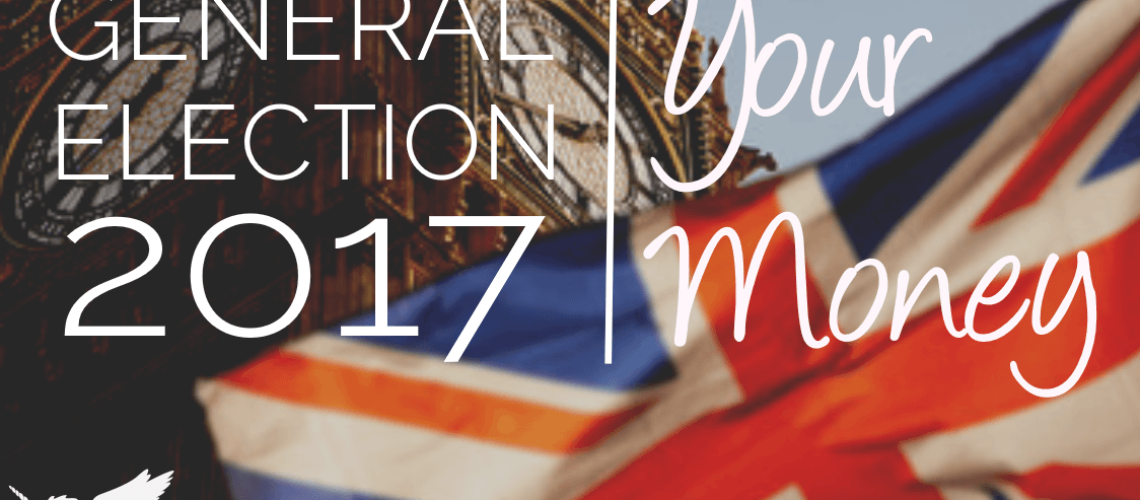The Election 2017 : What will it mean for your money?
Another year, another important vote. As a country, after Brexit last year and the previous general election only being in 2015, this will be the third year we have been asked to make an important decision about the future of the UK.
The headlines and hype around the campaigns can easily put you off with each media outlet having it’s own agenda. But this election in real terms, could have a powerful impact on your daily finances as it could directly affect you and the money in your pocket.
So what are the pledges and manifestos of each party across the financial matters?
Pensions
With a high proportion of this age group voting this is a key battleground with the focus mainly on the ‘triple lock’ which guarantees a minimum increase in the state pension each year.
While Labour and the Liberal Democrats have said they would maintain the ‘triple lock’ throughout the next Parliament, the Conservative Party plans to change the system which sees the state pension raised in line with whichever is the highest out of inflation, average earnings or 2.5%.
This was based on a recommendation from a CBI report which points out that when the state pension was introduced in 1908, we were not expected to live much beyond the age of 50 yet today’s average life expectancy is firmly in the eighties.
The population is growing, ageing and living for longer thus the current pension system is financially unsustainable and that the workforce of tomorrow will be the ones paying for the pensions of tomorrow’s retirees.
Tax
Taxation is one of the main dividing lines between the parties in the election, as politicians set out different visions of a tax system.
The Conservatives have pledged that the personal tax allowance would rise to £12,500 by 2020, while the higher rate threshold would move up to £50,000.
Labour has vowed to target what they consider to be the ‘rich’ people – anyone earning more than £80,000 a year would face an income tax hike to 45p, while there will be a new 50% rate on earnings above £123,000. This is their most left wing position for many years.
They are also looking to scrap the married person’s tax allowance, where married couples only can save up to £230 a year if one of them has an income of £11,500 or under.
And in tune with their current stance, parents paying school fees would now have to pay VAT thus adding 20% to the bill.
The Lib Dems would add a 1p in the pound hike on income tax and in a bid to ‘make the wealthiest pay their share’ they will be taking on tax avoidance schemes and making sure unearned wealth is taxed higher than earned incomes.
Property & the housing market
Generally the property market has quietened down over the past few weeks as both buyers and sellers have decided to hold tight to see what the outcome of the election is. And all Parties have kept quiet about relaxing the recent change in rules around the Buy To Let market.
Perhaps one of the most discussed plans linked to property was from the Conservatives who said they would raise the threshold for paying for social care from £23,000 to £100,000. However, under this policy, the person’s home would also be included in their calculation of assets for home care as well as residential care. Although it is not officially included in the manifesto and Theresa May recently said they would consult on a cap on care costs.
Another more recent pledge has come from Labour saying that they would replace council tax with a Land Value Tax (LVT), which would hit people with gardens the hardest. Some analysis shows that it would result in yearly tax bill of £3,837 for an average family home in England which is a 224 per cent increase on the current average council tax bill of £1,185.
The Labour Land Campaign policy paper suggests they would introduce LVT gradually at first by charging 0.85 per cent on the value of homes in replacement for the council tax. But it would rush in a three per cent rate on estates, privately rented properties, new build homes and holiday homes.
On a similarly tough note, the Liberal Democrats following their theme of making the wealthiest pay, they have said that they would introduce a higher council tax on second homes, potentially as high as 200%.
They would also introduce a “rent to buy” scheme, where rent payments would contribute towards eventually owning a share in the property to help solve the current unaffordable housing issues the younger generation our facing.
Within the rental market, under a Labour government, renters would benefit from three-year tenancies and capped rent rises which would very positive for tenants, but not good news for landlords.
Working and Lifestyle
Both the Conservatives and Labour made pledges around the National Living Wage – with the Tories raising it to 60 per cent of earnings by 2020 and the latter said would hike it to the level of the living wage by 2020 which it predicted that would be about £10 an hour at least.
Labour have promised to scrap student tuition fees, although no further information has been forthcoming as to how this multibillion pound plan would be funded.
With an aim to support young working families they have also committed to more free childcare being rolled out and a pledge that maternity pay would be extended to 12 months, while paid paternity leave would double to four weeks.
Like Labour, the Lib Dems also said that they would roll out 15 hours of free childcare to two-year-olds and add an extra month’s paid paternity leave to fathers’ entitlements.
Both are very attractive propositions for the young workers but could cause additional problems for smaller businesses.
The Conservatives are very vocal in wanting to support working families but there were no bold pledges. In a bid to free up more government cash to reinvest, they have said that there will be no more free school lunches for primary school children aged up to seven, although some children would benefit from free “breakfast clubs” instead.
However a lot of the headlines fail to mention that those poorer families that need assistance with school dinners will still receive it, which is going back to the old system.
This move would save about £650 million a year, which would go towards boosting school funding by £4 billion over the next parliament.
All in all there are many pledges that could affect you financially and every single person will vote for the party they think looks after their interest and needs the best.
When the results are in
But as we’ve seen in recent history with Brexit and the US elections, the financial economy may have a knee jerk reaction to the result but it does eventually bounce back.
If after the election you would like to talk to one of our Financial Advisors about the pledged changes and what you could do to mitigate any financial losses, call us on 01892 300 303, or take a look at our website www.prosperityifa.com.


